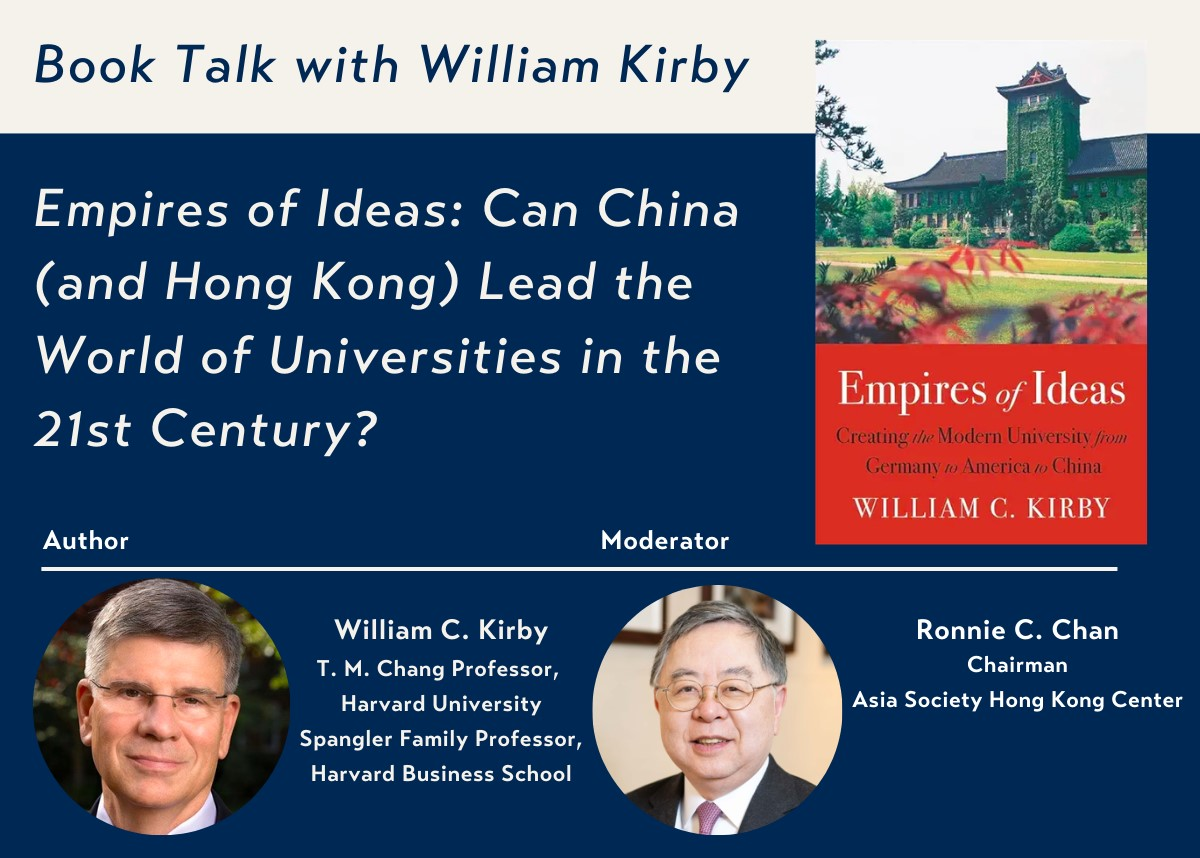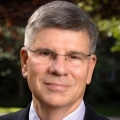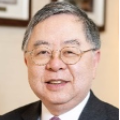Empires of Ideas: Can China (and Hong Kong) Lead the World of Universities in the 21st Century?
VIEW EVENT DETAILSBook Talk with William Kirby

RUNDOWN:
12:00 Registration
12:30 Welcoming Remarks
12:35 Lunch
13:10 Opening Remarks
13:15 Fireside Chat
13:35 Q&A with Audience
13:55 Closing Remarks
14:00 End
ASHK Members and Harvard University Alumni: HKD 580
Non-Member Ticket: HKD 680
Asia Society Hong Kong Center is proud to present a luncheon discussion with William C. Kirby, T. M. Chang Professor of China Studies at Harvard University and Spangler Family Professor of Business Administration at the Harvard Business School.
In his latest book, Empires of Ideas: Creating the Modern University from Germany to America to China, Professor Kirby explores the development of modern research universities from the model set by German institutions to the dominance of American universities in global rankings to the emergence of Chinese universities in prominence and esteem. In conversation with Ronnie C. Chan, Chairman of Asia Society Hong Kong center, Mr. Kirby will consider what has made US universities so successful, how China’s universities have become innovative institutions, and whether their respective successes can continue in view of the challenges they face.

William C. Kirby is T. M. Chang Professor of China Studies at Harvard University and Spangler Family Professor of Business Administration at the Harvard Business School. He is a Harvard University Distinguished Service Professor. He serves as Chair of the Harvard China Fund and the Harvard Center Shanghai.
A former dean of Harvard’s Faculty of Arts and Sciences, his research and consulting focus on strategies for business and education in China. He chairs the Board of Directors of the American Council of Learned Societies, Harvard Magazine, and The Taiwan Fund, Inc. He serves on the Board of Directors of Cabot Corporation and Schwarzman Scholars at Tsinghua University. He served as Senior Advisor on China to Duke University in the founding of Duke Kunshan University and presently sits on its Advisory Board.
His latest books include Can China Lead? (Harvard Business Review Press); China and Europe on the New Silk Road (Oxford University Press); and, most recently, Empires of Ideas: Creating the Modern University from Germany to America to China (Belknap Press of Harvard University Press). He is a fellow of the American Academy of Arts and Sciences.

Mr. Ronnie C. Chan is the Chair of Hang Lung Group Limited and its subsidiary Hang Lung Properties Limited, both publicly listed in Hong Kong. Hang Lung expanded into mainland China in 1992, developing, owning and managing world-class commercial complexes in key tier one and tier two cities. In 1986, Mr. Chan co-founded Morningside, a diversified investment group engaged in private equity and venture capital investments in North America, Asia, and Europe. He founded and chairs the China Heritage Fund, and is a co-founding Director of The Forbidden City Cultural Heritage Conservation Foundation in Beijing. Mr. Chan is a Fellow of the American Academy of Arts and Sciences, Chair Emeritus of the Asia Society and Chairman of its Hong Kong Center, and Co-Founder and Chairman of the Centre for Asian Philanthropy and Society. He serves or has served on the governing or advisory bodies of several think tanks and universities, including: Peterson Institute for International Economics, World Economic Forum, East-West Center, Pacific Council on International Policy, Eisenhower Fellowships, The Maureen and Mike Mansfield Foundation, University of Southern California, Indian School of Business, The Hong Kong University of Science and Technology, Yale University, Tsinghua University, and Fudan University.
About Empire of Ideas:
Today American institutions dominate nearly every major ranking of global universities. Yet in historical terms, America’s preeminence is relatively new, and there is no reason to assume that U.S. schools will continue to lead the world a century from now. Indeed, America’s supremacy in higher education is under great stress, particularly at its public universities. At the same time Chinese universities are on the ascent. Thirty years ago, Chinese institutions were reopening after the catastrophe of the Cultural Revolution; today they are some of the most innovative educational centers in the world. Will China threaten American primacy?
Empires of Ideas looks to the past two hundred years for answers, chronicling two revolutions in higher education: the birth of the research university and its integration with the liberal education model. William C. Kirby examines the successes of leading universities—The University of Berlin and the Free University of Berlin in Germany; Harvard, Duke, and the University of California, Berkeley, in the United States—to determine how they rose to prominence and what threats they currently face. Kirby draws illuminating comparisons to the trajectories of three Chinese contenders: Tsinghua University, Nanjing University, and the University of Hong Kong, which aim to be world-class institutions that can compete with the best the United States and Europe have to offer.
But Chinese institutions also face obstacles. Kirby analyzes the challenges that Chinese academic leaders must confront: reinvesting in undergraduate teaching, developing new models of funding, and navigating a political system that may undermine a true commitment to free inquiry and academic excellence.
Buy a copy of Empire of Ideas from our store.
3-Course Set Lunch
Regular Menu
Baby Gem & Prosciutto
Bocconcini, Cherry Tomato, Honey Mustard Dressing
*****
Roasted Scotch Salmon Fillet
Curry Couscous, Broccolini, Garlic Aioli
*****
Chocolate Brownies
Served with Honey Mascarpone, Macaron, Vanilla Sauce
Vegetarian Menu
Baby Gem & Fennel Salad
Orange, Radish, Cherry Tomato, Cucumber, Citrus Dressing
*****
Wild Mushroom Risotto
U.S. Kale, Mascarpone, Grana Padano
*****
Chocolate Brownies
Served with Honey Mascarpone, Macaron, Vanilla Sauce
Sign-up link

The views and opinions expressed are those of the speakers and participants and, unless expressly stated to the contrary, do not reflect the opinion, position, or official policy of Asia Society Hong Kong Center, its members, or its committees. Asia Society Hong Kong Center does not endorse or approve, and assumes no responsibility for, the content of the information presented.
Event Details
Jockey Club Hall, Asia Society Hong Kong Center, 9 Justice Drive, Admiralty
